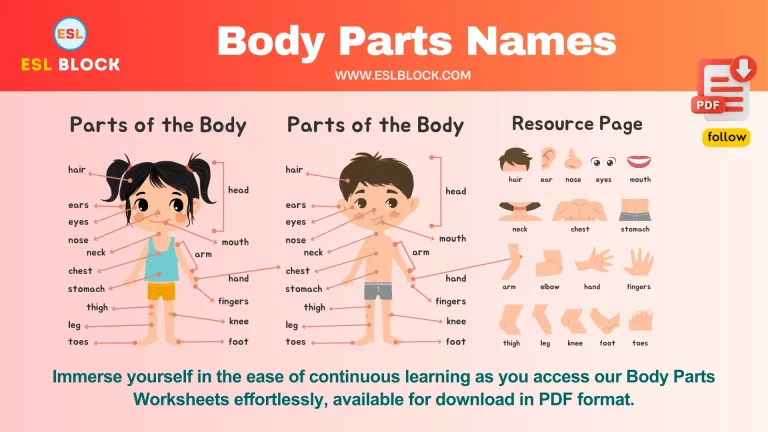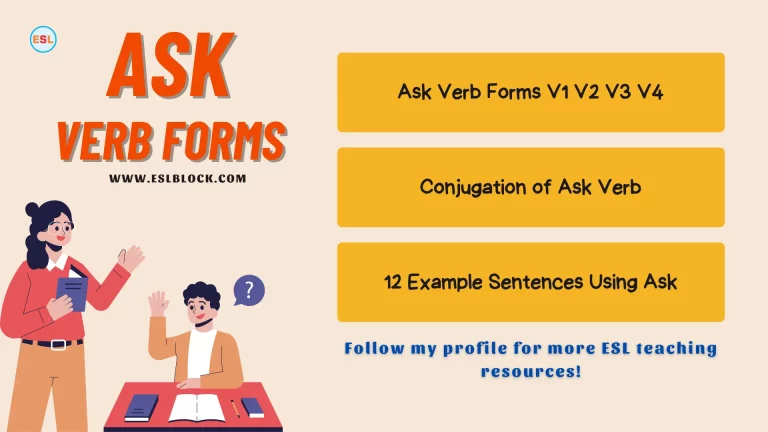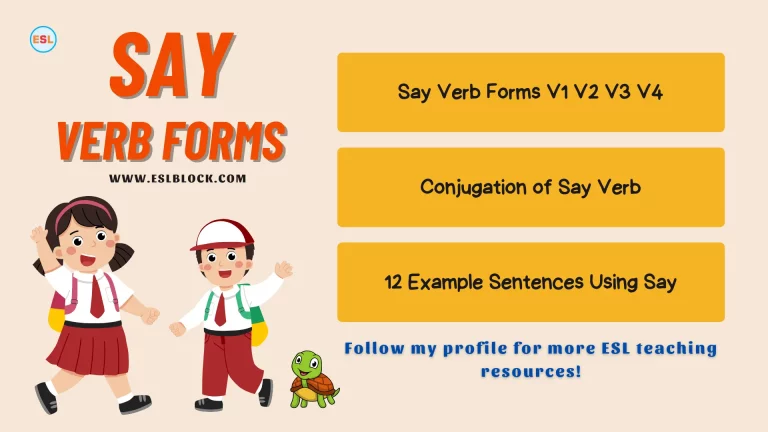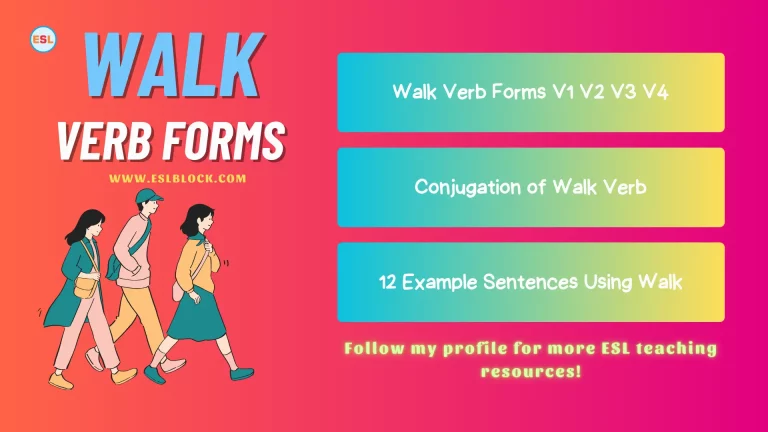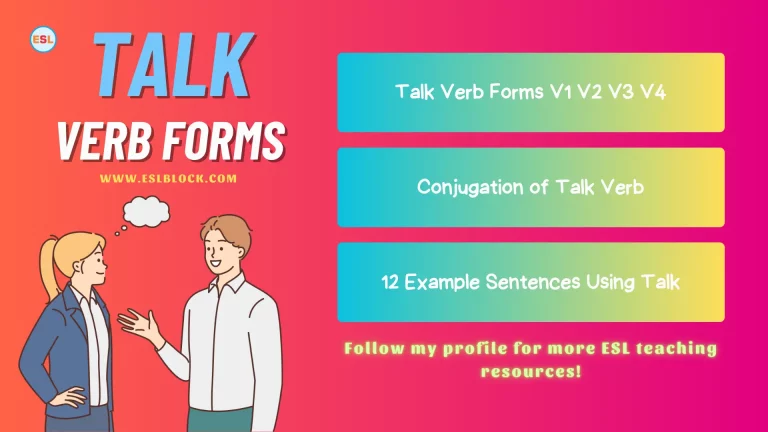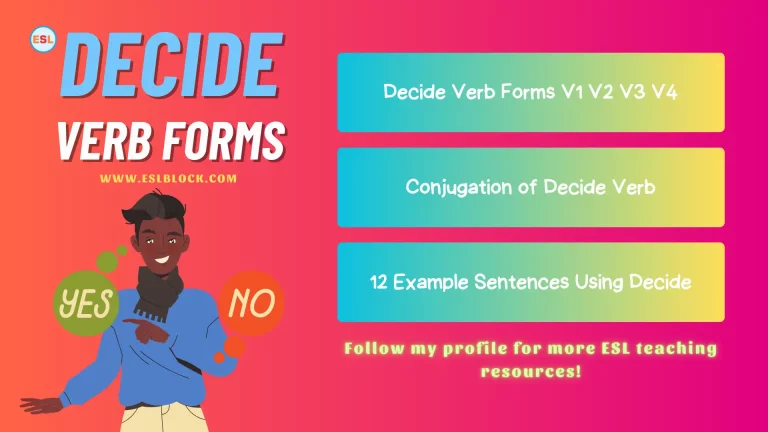What is a Pronoun in English Grammar?
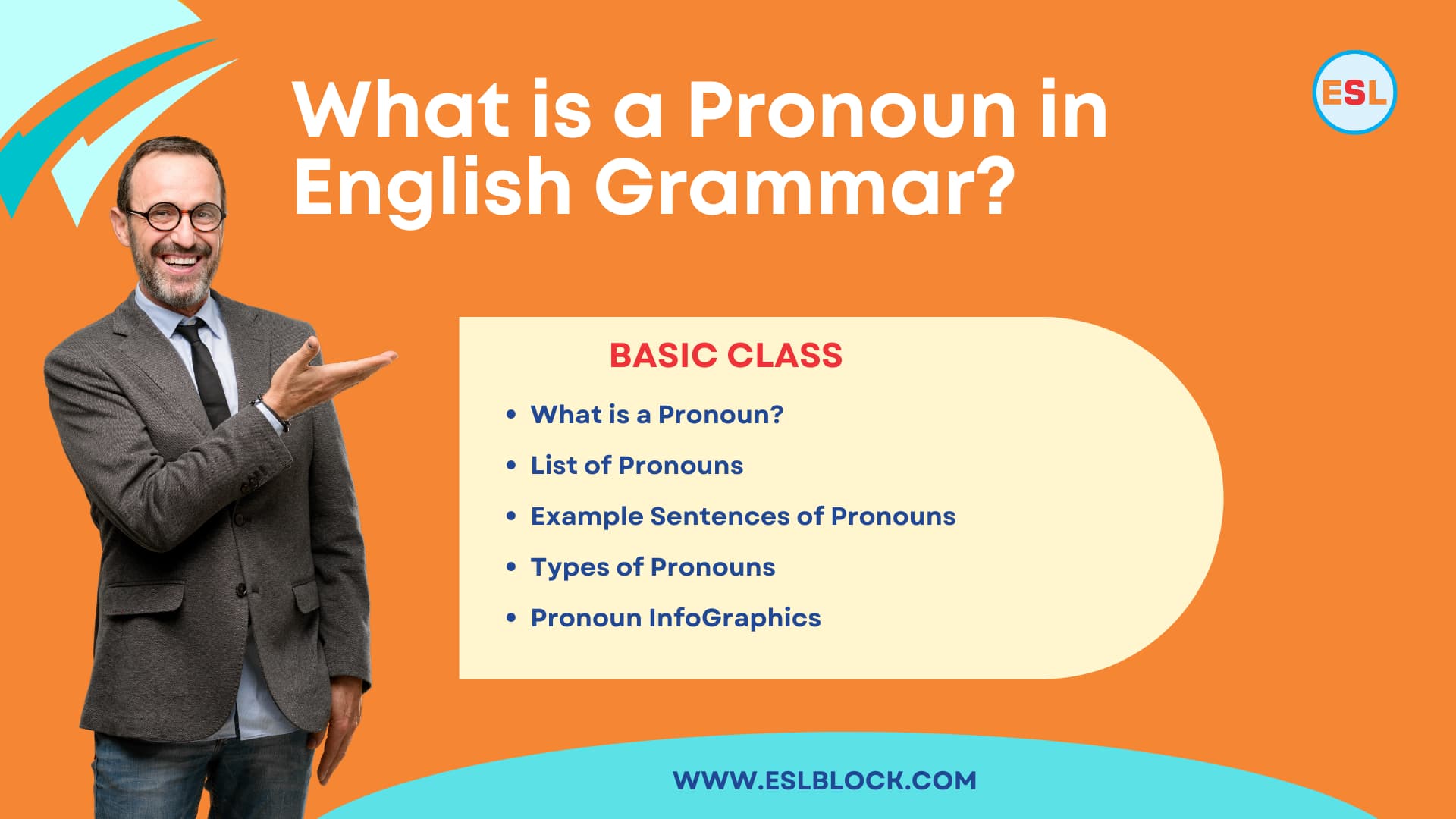
What is a Pronoun in English Grammar? If you’re oriented with English spoken language or the general language, you’ve probably heard of Pronoun. A pronoun is a word that replaces a noun or noun phrase. What are pronouns? How do you use them in English writing? This article will discuss the meaning of pronouns, the appropriate times to use them, and practice sentences of pronouns.
As a guide, the below definitions and tables provide the fundamental use of the pronoun. Read on to get a more in-depth explanation of the rules and examples of when and how to use a pronoun.
Learn to use pronoun with example sentences and ESLBLOCK worksheets for printing.
Also read: Baby Farm Animals
What is a Pronoun?
Pronouns are short words that are used to replace a noun or a noun phrase. Pronouns are either the noun previously mentioned or the noun that does not require naming specifically. Pronouns are one of the nine parts of speech.
The most commonly used pronouns are personal pronouns. They are used to describe the person or persons who write or speak (first person) and the persons who are being addressed (second person) or any other person as well as objects (third person). Like nouns, the personal pronouns may function as either the verb’s subject as the subject of verbs or the object of a verb or preposition.
- Are these books yours?
- This bike is ours.
- I have more chocolates than her.
- We will be late if you don’t hurry up.
- They are making good progress.
Pronoun is a radically different part of speech from a verb, noun, conjunction, adjective, and the rest.
List of Pronouns
While you go through the list of pronouns, be aware that each pronoun is a word that can be used in place of nouns. Consider ways to include these pronouns in sentences since this can help you understand. The following list shows some examples of some common pronouns;
- I
- All
- Any
- Anybody
- Anyone
- Anything
- Both
- Each
- Either
- Everybody
- Everyone
- Everything
- Few
- He
- Her
- Herself
- Him
- Himself
- It
- Itself
- Many
- Me
- Most
- Myself
- Neither
- No one
- Nobody
- None
- Nothing
- One
- Ourselves
- Several
- She
- Some
- Somebody
- Someone
- Something
- That
- Them
- Themselves
- These
- They
- This
- Those
- Us
- We
- What
- Which
- Whichever
- Who
- Whoever
- Whom
- Whomever
- Whose
- You
- Yourself
- Yourselves
Example Sentences of Pronouns
Here are some example sentences using pronoun!
- We are going to Australia.
- Don’t tell me that you can’t go with us.
- These are terribly steep paths.
- They ran into each other at the shopping mall.
- I’m not sure which is worse: snow or rain.
- It is one of the most excellent Italian restaurants in New York.
- William stared at himself in the mirror.
- The laundry isn’t going to do itself.
- Someone spilt mango juice all over the countertop!
Types of Pronouns
There are twelve main types of pronoun.
- Personal pronouns
- Antecedents
- Relative pronouns
- Demonstrative pronouns
- Indefinite pronouns
- Reflexive pronouns
- Intensive pronouns
- Possessive pronouns
- Interrogative pronouns
- Reciprocal pronouns
- Distributive pronouns
Personal pronouns
When you assume pronouns, you most likely think of personal pronouns. Personal pronouns are pronouns that direct to a specific person or group. Personal pronouns include:
- He/him
- I/me
- She/her
- They/them
- We/us
- You
Personal pronoun Example sentences
- I have hazel eyes.
- They are coming to my office.
- She is my best friend.
- I am afraid of water.
- I don’t want to go.
- You are a talented actress.
- They went to the office.
There are two further types of personal pronouns: Subject Pronouns and Object Pronouns.
Subject Pronoun
Subject pronoun is used, when the thing or person is the subject of the sentence.
Subject pronoun list: he, she, I, you, it, we, they.
Subject pronoun examples:
- I like to watch movie, but he does not.
- You are a talented student.
- He struck her on the nose.
- She studies hard to pass the test.
- I don’t want to buy a book.
- You are a smart girl.
- They went to school.
Object Pronoun
When the thing or person is the object of the sentence, object pronouns is used.
Object pronoun list: you, me, him, her, it, them, us, you
Object pronoun examples:
- Emily likes him but not me.
- Samuel will call you soon.
- Don’t tell her the truth.
- Aurora helped him pull his boots off.
- Go talk to him.
- Has anyone met her?
- Come sit with us.
Antecedents
Did you remember that for a person to be able to speak with a pronoun, you must introduce the noun before you can use it? This noun has a name: an antecedent.
Antecedents are essential since pronouns can be used in a variety of ways. Take a look at it–“it” could mean a bike, a tree or a car, or a city. But we’ve used the word to mean another thing entirely pronouns’ versatility. Check out these examples to understand how antecedents and pronouns function together:
- Her family tests her patience, but she loves them.
- Addison said she is almost finished with the book.
Relative pronouns
Relative pronouns connect relative clauses to independent clauses. Often, relative pronouns introduce additional information about something mentioned in the writing. Generally who is used for persons, which for animals and that is used for things. Relative pronouns include these words:
- that
- what
- which
- who
- whom
Relative pronoun Example sentences
- The man who called yesterday wants to buy the car.
- Now they were driving by the garden which Natalie had described.
- She is a good artist whose work I really like.
- All the cas that got adopted today will be loved.
- My bike, which is nearly five years old, still lloks well.
Demonstrative pronouns
Demonstrative pronouns take the place of a noun or a noun phrase that has already been noted or is clear via context, either in written or oral communication. This, these, that, and those are demonstrative pronouns.
Demonstrative pronoun Example sentences
- These are the best shoes.
- Josephine likes the red flowers but she prefers those yellow ones over there.
- He would like that one.
- Those aren’t apples, they’re pears.
Indefinite pronouns
Indefinite pronouns are employed when you want to identify a person or thing that doesn’t have to be identified. Some common indefinite pronouns are one, other, some, several, none, both, each, everybody, anybody and no one.
Indefinite pronoun Example sentences
- Nobody is going to China.
- There are several cats in my town.
- She likes both of these books.
Reflexive pronouns
Reflexive pronouns will end in -self or -selves and are used for another pronoun. Reflexive pronouns include these words:
- Herself
- Himself
- Itself
- Myself
- Oneself
- Ourselves
- Themselves
- Yourself
- Yourselves
Reflexive pronoun Example sentences
- You should take care of yourselves.
- He goes to school himself.
- Quinn can do it by herself.
- You could walk by yourself.
- Julia tried it herself.
- Joseph hurt himself.
Intensive pronouns
The intensive pronoun refers to a second noun or pronoun in the same sentence to emphasize its meaning.
Intensive pronoun Example sentences
- I told you I could do it myself.
- They asked themselves, is this job really worth saving?
- The cat caught the toy itself.
- Eliza cooks lunch herself.
- I eat my cake myself.
Possessive pronouns
The possive pronouns are used to denote possessiveness or ownership, in English. Possessive pronouns include these words:
- Her
- His
- Its
- My
- Our
- Their
- Your
Possessive pronoun Example sentences
- I crashed my bcar into a big tree.
- Your office is always decorated so airy.
- Do you see that girl over there? Her cat is very fluffy.
- Is that your car? No, ours is the one inside home.
- These pens are mine, not yours.
- This is my brother‘s shirt. It’s his.
Interrogative pronouns
Interrogative pronouns are used in questions. Interrogative pronouns include these words:
- Who
- Which
- Where
- How
- What
- Whose
Interrogative pronoun Example sentences
- Who wants a book of suspense stories?
- What is your name?
- Which book do you want to read?
- Whose skirt is this?
- How many mangoes do you have?
- Which way is the office?
- Is that where the cat goes?
Reciprocal pronouns
The reciprocal pronoun is used to indicate the same action or emotion that is reciprocated.
There are only two reciprocal pronouns;
- Each other
- One another
Reciprocal pronoun Example sentences
- They are not happy with each other.
- The two sisters really care about one another.
- Isabelle and Lincoln, the two top salespeople in our office, are competing with each other for Salesperson of the Year title.
Distributive pronouns
Distributive pronouns describe people, animals, or objects as individuals in larger groups. They help you pick out people while acknowledging they are part of a larger group. Distributive pronouns include these words:
- Any
- Each
- Either
- Neither
- None
Distributive pronoun Example sentences
Here are a some examples of distributive pronouns in sentences:
- Each of the students have participated in the school sports.
- I may buy either of these two bikes.
- Neither of them run fast.
- Each one of you will be awarded with award.
- Everyone must finish the dinner.
- All of my brothers entered the costume contest and none of them won.
- Chicken and vegetable are available for lunch. Neither is appealing to me.
Pronoun InfoGraphics
Here are some printable infographics about Pronoun. Printable infographics are a fantastic way to share a significant amount of details in a short time in a stunning way. The Pronoun infographic can help teachers and students to share their thoughts easily.
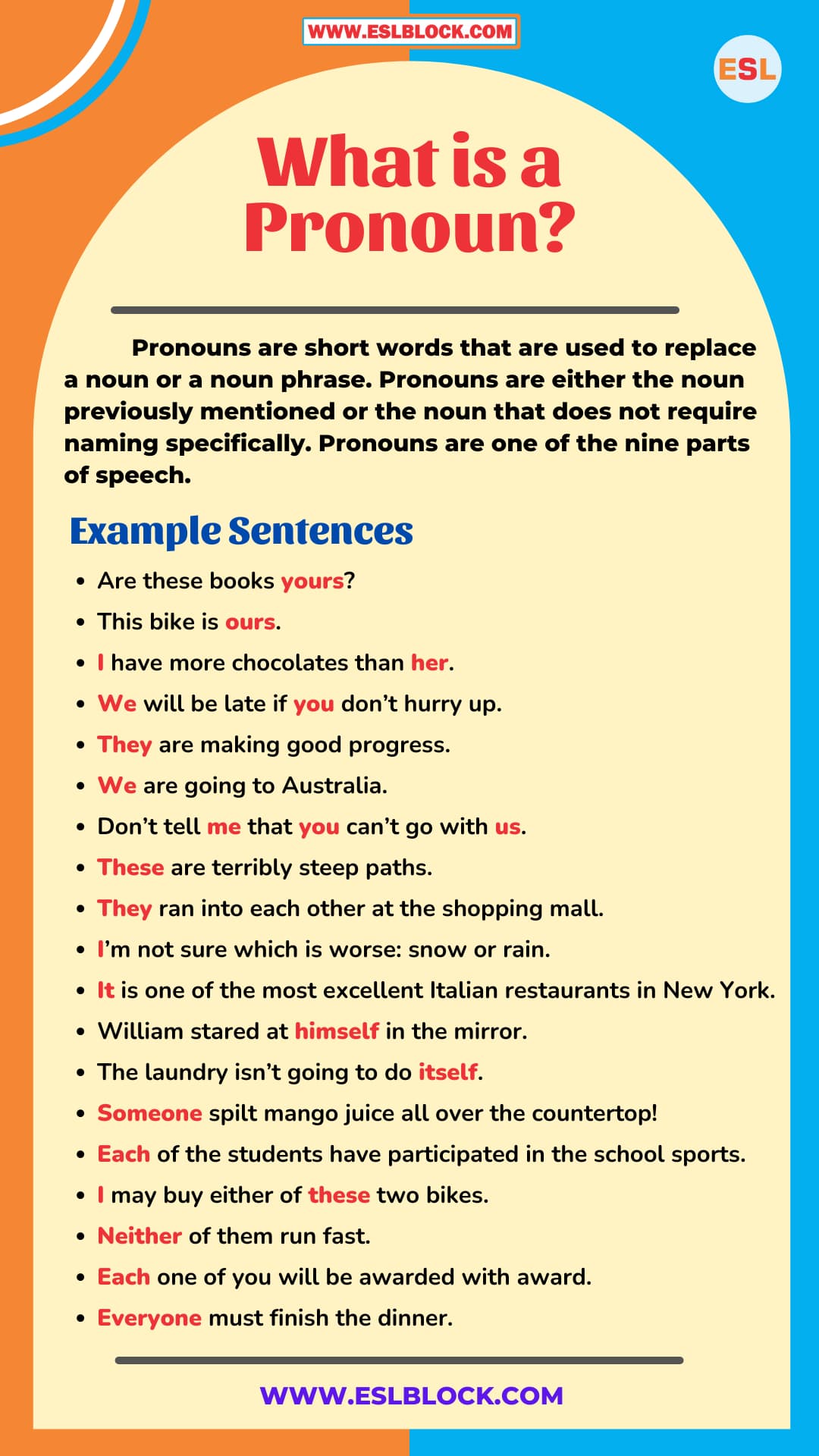
My Considerations
With this set of activities and explanations, you will quickly determine whether you are making the most effective use of the pronoun and how they could be used to enhance English writings.
Since the pronoun are the main part of English Grammar, the importance of developing English learning skills cannot be undervalued without pronoun.
You can read the above sample sentences about Pronoun to improve your understanding of English grammar.
Encourage your children to learn these basic but commonly used pronoun, by following the simple example sentences given above. Then, save this list of pronoun sentences, handy for your kids in future.
If you enjoyed a printable infographic about What is an pronoun, I’d be very thankful if you’d help it spread by emailing it to your friends or sharing it on Pinterest, Reddit, Twitter, Instagram, or Facebook. Thank you!
Also read: Adjectives That Start With Y
Recap of what we just learned
- What is a Pronoun?
- List of Pronouns
- Examples of Pronouns
- Types of Pronouns
- Personal pronouns
- Antecedents
- Relative pronouns
- Demonstrative pronouns
- Indefinite pronouns
- Reflexive pronouns
- Intensive pronouns
- Possessive pronouns
- Interrogative pronouns
- Reciprocal pronouns
- Distributive pronouns
- Pronoun InfoGraphics
With ESLBLOCK, you will not face problems studying new ideas. If you are in doubt, the qualities of blog post about What is a conjunction, reach us through our blog’s comment section. Keep checking back! We’ll attempt to give you feedback as early as possible. Thank you!
Also read: Adjectives That Start With Z
Related Topics
Explore the full list of Adjectives to Describe a Person from A to Z!
- A Adjectives to Describe a Person
- B Adjectives to Describe a Person
- C Adjectives to Describe a Person
- D Adjectives to Describe a Person
- E Adjectives to Describe a Person
- F Adjectives to Describe a Person
- G Adjectives to Describe a Person
- H Adjectives to Describe a Person
- I Adjectives to Describe a Person
- J Adjectives to Describe a Person
- K Adjectives to Describe a Person
- L Adjectives to Describe a Person
- M Adjectives to Describe a Person
- N Adjectives to Describe a Person
- O Adjectives to Describe a Person
- P Adjectives to Describe a Person
- Q Adjectives to Describe a Person
- R Adjectives to Describe a Person
- S Adjectives to Describe a Person
- T Adjectives to Describe a Person
- U Adjectives to Describe a Person
- V Adjectives to Describe a Person
- W Adjectives to Describe a Person
- X Adjectives to Describe a Person
- Y Adjectives to Describe a Person
- Z Adjectives to Describe a Person

